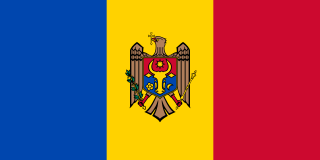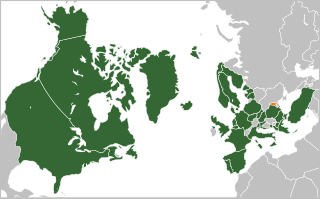Related Research Articles

Moldova, officially the Republic of Moldova, is a landlocked country in Eastern Europe, on the northeastern corner of the Balkans. The country spans a total of 33,483 km2 (12,928 sq mi) and has a population of approximately 2.5 million as of January 2023. Moldova is bordered by Romania to the west and Ukraine to the north, east, and south. The unrecognised breakaway state of Transnistria lies across the Dniester river on the country's eastern border with Ukraine. Moldova is a unitary parliamentary representative democratic republic with its capital in Chișinău, the country's largest city and main cultural and commercial centre.

The European Union (EU) has expanded a number of times throughout its history by way of the accession of new member states to the Union. To join the EU, a state needs to fulfil economic and political conditions called the Copenhagen criteria, which require a stable democratic government that respects the rule of law, and its corresponding freedoms and institutions. According to the Maastricht Treaty, each current member state and the European Parliament must agree to any enlargement. The process of enlargement is sometimes referred to as European integration. This term is also used to refer to the intensification of co-operation between EU member states as national governments allow for the gradual harmonisation of national laws.

This is a list of referendums related to the European Union, or referendums related to the European Communities, which were predecessors of the European Union. Since 1972, a total of 48 referendums have been held by EU member states, candidate states, and their territories, with several additional referendums held in countries outside the EU. The referendums have been held most commonly on the subject of whether to become a member of European Union as part of the accession process, although the EU does not require any candidate country to hold a referendum to approve membership or as part of treaty ratification. Other EU-related referendums have been held on the adoption of the euro and on participation in other EU-related policies.

The ȘOR Party is a populist political party in Moldova. Known from its foundation in 1998 until October 2016 as the Socio-Political Movement "Equality", the party holds Eurosceptic and Russophilic stances.

Relations between the European Union (EU) and Moldova are currently shaped via the European Neighbourhood Policy (ENP), an EU foreign policy instrument dealing with countries bordering its member states.

There are nine recognised candidates for membership of the European Union: Albania, Bosnia and Herzegovina, Georgia, Moldova, Montenegro, North Macedonia, Serbia, Turkey, and Ukraine. Kosovo formally submitted its application for membership in 2022 and is considered a potential candidate by the European Union.

Official relations between Moldova and NATO began in 1992 when Moldova joined the North Atlantic Cooperation Council. However, as Moldova's neutrality is enshrined in its constitution, there are no official plans for Moldova to join the organization.

On 28 February 2022, four days after it was invaded by Russia, Ukraine applied for membership of the European Union (EU). Ukrainian President Volodymyr Zelenskyy requested immediate admission under a "new special procedure", and the presidents of eight EU states called for an accelerated accession process. European Commission president Ursula von der Leyen stated that she supports Ukrainian accession, but that the process would take time. On 10 March 2022, the Council of the European Union asked the commission for its opinion on the application. On 8 April 2022, von der Leyen presented Zelenskyy with a legislative questionnaire, which Ukraine responded to on 9 May.

Dorin Recean is a Moldovan economist and politician serving as Prime Minister of Moldova since February 2023. Since 2022 he has also served as Presidential Advisor on Defense and National Security, and Secretary of Moldova's Supreme Security Council. He previously served as Minister of Internal Affairs of Moldova from July 2012 to February 2015. He has extensive experience in the private sector and in the IT industry with a specialisation in data, including big data, and information analysis. He also worked in development institutions and was previously a lecturer at several universities.

Maia Sandu is a Moldovan politician who has been the President of Moldova since 24 December 2020. She is the founder and former leader of the Party of Action and Solidarity (PAS) and former Prime Minister of Moldova from 8 June 2019 until 14 November 2019, when the government collapsed after a vote of no-confidence. Sandu was Minister of Education from 2012 to 2015 and member of the Parliament of Moldova from 2014 to 2015, and again in 2019.

The Party of Action and Solidarity is a liberal political party in Moldova. The PAS was founded by Maia Sandu, the former Minister of Education and the incumbent president of Moldova. A pro-European party, it is an observer of the European People's Party (EPP) and the International Democrat Union (IDU).

The accession of Moldova to the European Union (EU) is on the current agenda for future enlargement of the EU.

Snap parliamentary elections were held in Moldova on 11 July 2021. Following the resignation of Ion Chicu, the position of Prime Minister became vacant, with the Parliament being obligated to form a new government within three months. After the expiration of the constitutionally mandated period and two failed attempts to win parliamentary approval for the proposed cabinets, the Constitutional Court ruled on 15 April that the circumstances justifying a dissolution of the parliament were met. President Maia Sandu signed the decree dissolving the Parliament on 28 April and snap parliamentary elections were called on.

Presidential elections were held in Moldova on 1 November. The fourth direct elections since independence in 1991, voters had the possibility to either elect a new president or re-elect the incumbent Igor Dodon. Because no candidate received a majority of votes in the first round, a run-off between the top two candidates, Maia Sandu and Dodon, was held on 15 November. Maia Sandu won the second round with 57.72% of the vote, becoming the first female President of the country and the first winner from the Party of Action and Solidarity (PAS).

Presidential elections are scheduled to be held in Moldova on 20 October 2024.

Natalia Gavrilița is a Moldovan economist and politician who served as prime minister of Moldova from 2021 until her resignation in February 2023 after failure to get her reform package enacted.

The Gavrilița Cabinet was the Cabinet of Moldova, led by former Finance Minister Natalia Gavrilița from 6 August 2021 until 16 February 2023.

On 18 September 2022, protests in Moldova began in the capital city of Chișinău, demanding the resignation of the country's pro-Western government, amid an energy crisis causing rising natural gas prices and inflation, caused in part by the war in Ukraine.
Events from the year 2023 in Moldova.
The European Moldova National Assembly was a pro-European rally held on 21 May 2023 at the Great National Assembly Square in Chișinău, Moldova. It had approximately 100,000 participants and counted with the participation of the President of Moldova Maia Sandu, the President of the European Parliament Roberta Metsola and various Moldovan public figures. The Moldovan diaspora also took actions in support of the assembly. The most important resolutions of the assembly were a commitment to join the European Union (EU) by 2030, a consolidation of this project as a state objective of Moldova and a possible start of accession negotiations with the EU before the end of 2023.
References
- ↑ "Moldova announces presidential elections, EU accession referendum for October". TVP World. Retrieved 2024-04-17.
- 1 2 3 4 "Moldova to hold EU accession referendum in autumn". SeeNews. Retrieved 2024-03-26.
- ↑ "Moldovan president launches campaign to promote EU referendum". Reuters . 2024-03-18.
The referendum would vote on enshrining Moldova's EU ambitions in the constitution ensuring that the bid is not derailed by future governments.
- ↑ "Moldovan president launches campaign to promote EU referendum". Reuters . 2024-03-18.
President Maia Sandu launched a campaign to promote an upcoming referendum on Moldova's push to join the European Union on Monday, calling on civil leaders to rally support for the country's accession to the 27-member bloc.
- ↑ "Moldova officially applies for EU membership". Al Jazeera. Retrieved 2024-03-26.
- ↑ "EU leaders grant Ukraine and Moldova candidate status". POLITICO. 2022-06-23. Retrieved 2024-03-26.
- ↑ euser (2023-12-17). "European Council decides to open accession negotiations with Ukraine and Moldova, grants candidate status to Georgia". EU4Digital. Retrieved 2024-03-26.
- ↑ "Moldova sets 2030 as EU accession target at massive pro-EU rally in Chisinau". 22 May 2023.
- ↑ Solovyov, Vladimir. "Moldova's Sandu Stakes Reelection on EU Integration". Carnegie Endowment for International Peace.
- ↑ "Moldovan Parliament backs bid to join EU, but divisions remain". Euractiv . 2024-03-22.
- ↑ "Gagauzia Voters Reject Closer EU Ties For Moldova". Radio Free Europe/Radio Liberty. 2014-02-03. Retrieved 2014-03-04.
- ↑ "Concerned About EU Integration, Moldova's Gagauz Region Holds Disputed Referendum". Radio Free Europe/Radio Liberty. 2014-02-02. Retrieved 2014-03-04.
- ↑ "Moldovan opposition announces new election bloc at Moscow event". Reuters. 21 April 2024. Retrieved 22 April 2024.